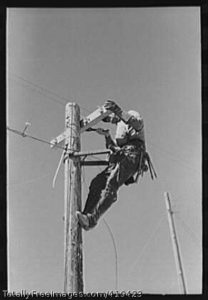My father broke his back when he was 30 years old; he had four children under the age of 9. When it became impossible for him to go to work, my parents sold the new station wagon they had recently bought (a red ’59 Chevy Bel Air—if you are old enough you may recall its fine horizontal fins) and put the money back in the bank, expecting to need it for food, mortgage and utilities.
 At that point my father had been working for ATT (back when it owned all of the regional telephone companies) for only six years, but he belonged to a labor union. The contract negotiated with ATT by the Communications Workers of America provided him with the surgery and other medical care he needed as well as a salary during the months he could not work. The back surgery was a success, and after a few months the body cast came off and he continued to work for the telephone company for another twenty-eight years. The contracts that allowed him to keep his job while recovering was a good thing for both the employees and the corporation: the extensive education in electronics that my father received from ATT, for example, continued to benefit the company for almost three decades.
At that point my father had been working for ATT (back when it owned all of the regional telephone companies) for only six years, but he belonged to a labor union. The contract negotiated with ATT by the Communications Workers of America provided him with the surgery and other medical care he needed as well as a salary during the months he could not work. The back surgery was a success, and after a few months the body cast came off and he continued to work for the telephone company for another twenty-eight years. The contracts that allowed him to keep his job while recovering was a good thing for both the employees and the corporation: the extensive education in electronics that my father received from ATT, for example, continued to benefit the company for almost three decades.
That was 1960, when labor unions were more common and more socially acceptable. Today, because of the war on unions and the poor in general, things are different. In a recent Labor Day editorial, Howard Hubbard, retired bishop of Albany, noted that “union membership is down, representing 11 percent of the overall workforce and 7 percent of private sector workers in 2013. In 1983, unions represented 20 percent of the overall workforce.” In Washington, “for-profit corporations outnumber those representing labor unions 50 to 1. About 72 percent of all expenditures on lobbying originate with organizations representing businesses.” Bishop Hubbard insists that “[i]t is imperative, therefore, that we promote workers’ organizations that defend their rights and ward off those forces of capitalism that can be exploitive and dehumanizing.”
Fortunately, there are glimmers of hope. Here in North Carolina an interfaith “Labor Sabbath” was organized in an effort to encourage ministers to mention the importance of unions and worker rights from the pulpit. Of course, Catholic Social Teaching supports the dignity of labor and the workers’ right to unionize, but occasionally it needs to be reawakened from its complacency. In the United States, the legacy of the great labor priests such as John Ryan, Paul Hanley Furfey and George Higgins lives on in Bishop Hubbard and many others. But as John Dilulio Jr. has recently written in America, “without a rebirth of the American Labor movement our nation’s interwoven economic and political inequalities will only become more sizable—and more sinful.”
David Hammond teaches theology for Saint Joseph’s College Online.

David, Your piece is so powerful, beautifully and simply stated… I, too, am the beneficiary and child of a labor family. Both my father and brother were shop stewards at Scott Paper Company for many years many years ago. Scott was once a family owned business. Now, of course, it is subsumed by a mega company. As church we have a proud history of support and leadership in the labor movement. You are so right about the need for a reawakening of that spirit. Thanks for a great piece…Susan O’Hara